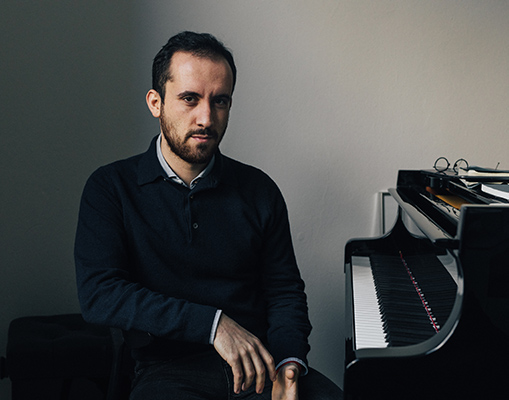Igor Levit triumphs in belated Chicago debut
Igor Levit made his Chicago debut Sunday afternoon at Orchestra Hall as part of the Symphony Center Presents Piano Series. The Russian-German pianist’s program consisted of two substantial contrasting works, each of which received superlative treatment in what was an essentially faultless recital.
The first half was devoted to Frederic Rzewski’s Dreams, Part 2, which was written for Levit in 2014. Dreams takes its inspiration from Akira Kurosawa’s film Yume, which consists of eight shorts based on the filmmaker’s own dreams. Each of the two parts of Dreams consists of four programmatic movements, combining to make eight that match the structure of Kurosawa’s film, though only Part 2 was written specifically for Levit.
The first movement, “Bells,” explores chiming effects of various speeds and textures across all registers of the piano. These wandering, dissonant tintinnabulations are variously austere, frantic, and warm, and Levit brought his formidable dynamic range to bear in evocatively emphasizing such contrasting moods.
A movement entitled “Fireflies” follows, a wash of trills and flitting gestures that evoke the title insects. Levit’s indomitable technique was on full display here. Even given the relative unfamiliarity of this music, one had complete confidence in the integrity of what one was played from Levit’s incisive exactitude.
The third movement (“Ruins”) opens with an attic monophonic melody. This gives way to bell-like gestures at the extreme ends of the piano’s range (reminiscent of the first movement) that create the sense of a yawning physical space, and alternate with nervy single-tone tremolos. These juxtaposed elements were expertly handled by Levit, whose ability to contain and rapidly shift between disparate textures is nothing short of remarkable.
The closing “Wake Up” follows attacca, and takes its inspiration from a children’s song by Woody Guthrie. The movement opens with the song’s semplice theme but soon gives way to driving aggression and more rapid affective shifts. The protracted coda is desiccated and improvisatory, and almost seems to inhabit the liminal space between dreaming and waking. Levit’s commanding rendition allowed this expressive music to speak for itself. Indeed, Rzewski could not have asked for a more committed advocate.
The second half was devoted to Beethoven’s mammoth Thirty-three Variations on a Waltz by Diabelli, Op. 120, more commonly known as simply the Diabelli Variations. Levit gave a towering performance of this heady, intricate opus; it is hard to imagine a more ideal live rendition.
The Theme went briskly as Levit underscored its angular jocularity. From the first variation to the last one of the most striking features of the performance was Levit’s exploration of incredibly soft dynamics. He possesses the force to deliver robust fortes when called for, but also the taste to save his power for when it is really indicated. The clarity and resonance he achieves at the lower end of the dynamic range is a rare commodity.
Variation Six had great pompous swagger, while Variation Ten was stunningly fleet, Fourteen had a resonant, pastoral glow, and 22 had a coy Mozartean air. Levit took a subtly longer pause going into the minor Variation 29. In his exquisitely sensitive rendition one was struck by the vast emotional distance traversed from the unassuming theme to the pathos of this variation. The intricate counterpoint of the triple-fugue Variation 32 was spry and lapidary, and the closing minuet had a wistful charm that fittingly capped off an extraordinary performance.
The audience brought Levit back to the stage for a single encore, Shostakovich’s understated Waltz-Scherzo, which made for a palate cleansing send off from a hearty and satisfying musical repast.
Daniil Trifonov performs on the SCP Piano Series 3 p.m March 26. The program includes Schumann’s Kinderszenen, Toccata, and Kreisleriana, selections from Shostakovich’s Op. 87 Preludes and Fugues, and Stravinsky’s Three Movements from Petrushka. cso.org; 312-294-3000.
Posted in Performances






Posted Mar 15, 2017 at 9:47 am by carmel schwartz
I heard the same program recently in New York. His performance
reminded me of when Glenn Gould made his New York debut. Igor
Levit is not only a great pianist but a profound artist the like of
which I have not heard in many years